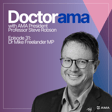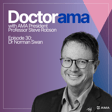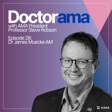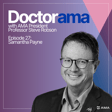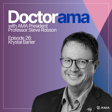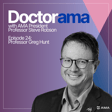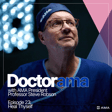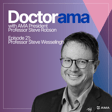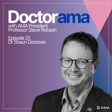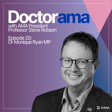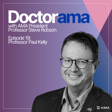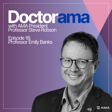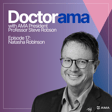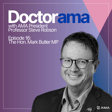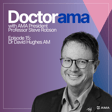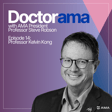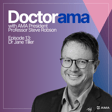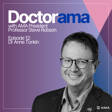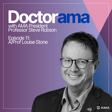Become a Creator today!Start creating today - Share your story with the world!
Start for free
00:00:00
00:00:01

Episode 25 - Melissa Reader
In episode 25 of Doctorama AMA President Professor Steve Robson chats with Melissa Reader, CEO of Violet.
Learn more about Violet at violet.org.au
Recommended
Transcript
Is a Good Death Achievable?
00:00:01
Speaker
Well, all of us want a good life and in the same way we want a good life, I think we all want a good death. But what exactly is a good death and do any of us really achieve it?
Introducing the Podcast and Guest
00:00:13
Speaker
We're going to talk about this with someone who knows today on Dr Rama.
00:00:20
Speaker
You're listening to Dr Rama with Steve Robson, bringing you the best of health, medicine and people. Well, my guest today on Dr Rama is Melissa Reeder, who's the CEO of the Violet Initiative. Melissa, welcome to Dr Rama. Hi, Steve. Thanks for having me. Melissa, we're going to talk about the Violet Initiative and about your own personal
Melissa's Personal Journey and Family Impact
00:00:42
Speaker
journey. But I think our listeners would like to know a little bit ah about your background and how you came, what it was that happened in your family that led you into this realm.
00:00:54
Speaker
Yeah, really happy to share that, Steve, because they are ah quite inextricably linked on many levels. Absolutely. ah So I am a ah very middle class Sydney girl. I was born and raised in the Hills District. ah My parents had news agencies for most of my childhood and they were quite busy seven day a week businesses. So I was out doing the paper run and serving behind the counter from probably about five or six. and with my mum and dad. ah Went to university at UNSW, started a career in advertising and then moved into consulting quite quickly for a range of reasons we probably don't need to go into. um can And met a a wonderful man from Milan, his name was was Mara, we met in a
00:01:48
Speaker
probably quite a dubious bar in Sydney one night. I fell in love, got married and had three beautiful little kids. Mauro and I were then running one of those consulting agencies here in Sydney together when he had a very sudden and really unexpected cancer diagnosis. He had not been himself for about 12 months prior to that in my view. and you know As wives normally do, they push their husbands to go to the doctor and it takes six months to get them to listen.
Challenges with Illness and System Support
00:02:20
Speaker
yeah That's the eternal story, isn't it? Isn't it just? but um It looked to me like he was putting on weight, Steve, and and what was actually happening was he had a belly full of ascites.
00:02:32
Speaker
Yeah, so that threw us into a a real whirlwind very, very quickly. um And as often happens now, and I understand other people's, he got very healthy within the first six months and actually was doing very, very well, but then built up a resistance to the treatment he was on and everything went downhill very quickly. um He died 15 months after his diagnosis. So he was 41 at that stage and and our kids were 7, 5 and 2. So it was it was really tough you know for so many reasons. But one of the things that I found most difficult was we we could never talk about what was happening to him.
00:03:19
Speaker
you know i I didn't have the language or the skills. um I really felt like I would have been betraying him to talk about what I was starting to see was ahead of us. And no part of the system helped us with that, Steve. We just bounced in and out of, you know, tens and tens of consults. He just went in and out of hospital over and over again, and and no one slowed us down and and helped us face that sad but true inevitability because I think things would have been very, very different if we had. Melissa, can I ask you two questions? The first one, and and I know with with children of my own, you had very young children when this tragedy occurred in your family. How did you the children cope with what was going on with Mara? Yeah, well, very differently. So my daughter, who was seven, um quite a quite a
00:04:17
Speaker
A grown-up seven-year-old, very involved, asked
Coping, Reflection, and New Beginnings
00:04:20
Speaker
me lots of hard questions. I had to be quite truthful with her. She was there with her dad the day he died, whether or not that was the right reason, the right decision I'm still grappling with. But she she was um she was much more involved. Our boys were four and two, and they were just confused and terrified. Yeah, so it wasn't the right thing to have them involved. And and to be honest, for a range of reasons. Mara didn't want that either. and He didn't want, he couldn't deal with them when he was in hospital and he didn't want to them to see him in there. Did your husband have family apart from you and the children in Australia or were they obsessed? Yeah, so his his parents, they they came over from Italy in the early 70s so he has been with his parents and with his sister and gosh it was hard for them to stay on.
00:05:14
Speaker
Melissa, many people would have been utterly overwhelmed with grief and retreated. I'm sure that you had a reaction like that. But it inspired you to do something with the experience that you had. And I'd love you to tell our listeners what you did and how you parlayed that experience into something bigger. Yeah, thanks, Steve. um Look, I was an absolute train wreck for the first couple of years after Nara's death, no doubt about it. But I, in that time, spent a lot a lot of my energy thinking about what had happened and and why it had played out so badly, because you know he shouldn't have spent so much time in hospital. He always wanted to be at home.
00:06:02
Speaker
He shouldn't have died in hospital in the way that he did, and we should have done some level of planning. I was left with no will, not a single conversation about how I was going to raise these three kids.
The Birth and Mission of the Violet Initiative
00:06:14
Speaker
I spent a lot of time thinking about that. and I did a program called Social Leadership Australia a couple of years after his death, which drew a lot on the work of Ron Heifetz at the Harvard Business School. And that was just an amazing catalyst for me on so many levels. But at the end of that year, there was a call for directors for a very small charity at that stage called Life Circle. And they were training volunteers, mentors in the community to go and help
00:06:44
Speaker
families who had loved ones who were dying and I could see immediately what this organization was trying to do. I was asked to join the board and I started to kind of dig a bit deeper. Now it was it wasn't very robustly run so I couldn't report the data that they'd gathered but there were over 70 percent of people that they supported out of home. So that really fascinated me, Steve. I thought something quite magic is here, but there's nothing scalable or sustainable about the model. So what we did with a really brave board was actually wind that down and spent the best part of 12 to 15 months really re-engineering it, figuring how to scale that as a national not-for-profit, finding our early funders. And that's what we've been focused on over the last couple of years, ah bringing that work to you know the tens and tens of thousands of people
00:07:32
Speaker
across the country who were caring for loved ones in that last stage of life. And I was so delightfully fortunate to have Kate Carnell join us about two years ago. yeah um Because Kate could really see the formative years of Beyond Blue and what that might mean for an organisation like Violet who were trying to follow a similar trajectory. Melissa, can I ask you quickly? I love the story behind the choice of Violet. as the name. Could you just tell our listeners a little bit about that choice and what Violet's about? It was quite deliberate actually because Life Circle was a bit of a forgettable name and people often just confused it. ah So I ran a process to find a name that was just really safe and gentle and reassuring for people and Violet is the last colour of the day and the first colour of the dawn. It's also the last colour on the visible spectrum before pure white.
00:08:29
Speaker
And it's a name that we've been able to personify as we move more and more into um tech-enabled solutions. So it's really been well received. As you said before, thousands of people are navigating this journey at
Improving End-of-Life Care
00:08:44
Speaker
any given time. And I suspect it's actually more than that when you and I spoke recently. In fact, all of us on on the conversation that you and I are involved in um had had similar experiences of many, I think, regrettable things related to the end of life of a loved one of us. Do you think that the sense that you know we have a good death is actually not the experience of a lot of people? I think it's absolutely not the experience of the overwhelming majority. ah We talk about
00:09:19
Speaker
just regret, regretful outcomes. What happens when things don't go to plan or there is no plan? And and that is the overwhelming experience for so many people. And and as you said, Steve, you've only got to open this conversation and and those stories come out. But you're right about the the amount of people, you know, we've got 180,000 people who die every year. 100,000 of those are predictable deaths. They can be planned for. We can have much better experiences for those predictable deaths, and that number is going to rise to over 400,000 within 15 years. so The thing that perplexes me, Steve, is that means that every week in this country, 3,000 to 4,000 people are dying, and the people around them are trying to manage this. and
00:10:05
Speaker
And I just can't think of another experience in our lives that happens with that level of frequency that we don't have a support system in place. We don't help people plan and navigate that. Yeah, absolutely. And I wanted to touch on the issue of a good death. And I i have to say, I've seen a bad death in my own mum when she succumbed. to cancer in the past. ah Before we move on to the work that the Violet Initiative and you in particular are doing, can you tell me, and you've clearly been now involved in this to a great degree, to what is a good death? And I mean, not only for the individual, but for the the loved ones and the carers around the individual, what is a good death?
00:10:56
Speaker
Yeah, um the first thing I would say is that that is not a statement that can be standardized or homogenized, nor should it ever be. In our view, in the work that we're doing, a good death is when the person who is facing the end of their life and those around them are able to talk about and acknowledge what's ahead. they are able to understand what's most important to that person in the last 12 months of their life. And they work together to deliver that. Now we are not saying that to die at home is the ultimate metric of a good death. It is what most people want. It is what 70% of us want, but there's also a large, I think it's about 30% of people see hospital as a safe death. But what we're focusing on Steve is how do we help people spend less time in hospital in the last 12 months? Because that's,
00:11:46
Speaker
That kind of you one of our advisors calls that the conveyor belt. It's the default response when you're not planned and you're not aware of what's ahead of you and you don't have the right services in place. People just end up presenting at ED. How do we help people be prepared for the inevitable health decline that is a part of that life stage so that they can make decisions that are right for their circumstances and they can help that person stay at home for as long as they can. that That is our wish. And I think we know we have we have many of those services in in place today. There is just an enormous delta between the overwhelm that people are feeling as they go through this and their ability to accept what's happening and engage with those services. So to segue to maybe your next question, that's the work we're trying to do. How do we build a bridge between
00:12:40
Speaker
a group of people, tens of thousands, some of the numbers go up to 1.6 million if you look at the number of people affected by a death. Yes, yes. How do you reach those people and help them accept and plan for that life stage so they can engage with services that give them a better outcome? Melissa, I'd like you to tell me about the work that the Viola Initiative is doing at the moment. And it's extraordinary work. And also where you see the initiative going, what's on the horizon for you guys?
Technology and Support Innovations
00:13:14
Speaker
I might flip that question, if that's the case. I do tend to use, and and Kate has really helped me to articulate this, I do use organisations like Beyond Blue and Lifeline yeah as as shortcut mental models for what we're trying to do here. We know that they are go-to organisations for mental health and suicide prevention.
00:13:34
Speaker
We are building Violet to become the place people turn to when they are planning for and managing the last stage of life. ah What we've been doing through the work of the National Not-For-Profit is a whole range of tools and resources to help people normalize this, build their confidence and their ability to talk to each other about it and put plans in place. We've also established a national network of volunteer Violet Guides. we Think about the role that the McGrath Breast Care Nurses and the Macmillan Nurses play in the UK. That's what our Violet Guides are starting to do. and And for the last three years, they've been delivering
00:14:11
Speaker
evidence-based support programs to people all over the country. We've had about 18,000 people through that. 18,000? Wow. It's been remarkable, Stephen, and really great outcomes. But again, that's not scalable either. yeah To try and match a human with a human is is quite expensive to do. And what we've learned is not everybody wants to talk to another person. A lot of people want a self-serve, self-led experience at 10.30 at night when they're stressed and they're on their phones looking for answers, you know, which is is pretty common behavior when any of us are faced with a big problem in our family and we're trying to find a way forward. So we have been taking all of the proprietary knowledge and learning from those three years of programs and actually building a technology solution that is a digital companion called Violet yeah that works with you in the way that our guides do.
00:15:05
Speaker
and I am so excited to um to share that. It's going to be released in early July um through the Not-For-Proforts platform. I can't wait to um to get that in the hands of people who need this help. I think that's an extraordinary step forward and I i absolutely agree that the work of somebody who's almost I guess is it fair to say like a navigator or guy to help you with to think through all of the things that you have to think through at this stage and looking at a technology to do that and we we all
00:15:39
Speaker
going to hear horror stories of what AI might do. But this sounds like an extraordinary way to capture these new technologies and put them to best use. How did you come up with the idea of the technological solution? Listen. look I would have been in that very skeptical category myself, Steve, even even as as recent as like maybe 15 months ago, but we were invited into Techstars, which is a global accelerator last year, and I think it was just as generative AI was starting to hit the mainstream. yeah What we have been amazed with is
00:16:15
Speaker
the level of emotional sophistication, sentiment analysis, ah the intuitive nature of this tool. And believe me, we have tested it within an inch of its life. there there would I wouldn't be responsible for releasing it unless I had absolute confidence in it. What this tool can do is meet people where they are. yeah So we've got the trans theoretical model behind the the product. We We are able to get a baseline really early to understand how emotionally ready our people are. They're totally overwhelmed, very distressed, and we need to meet them in that space. Or are they actually feeling quite pragmatic and they just want to get on and do some planning and get financial and legal matters in place. We need to understand where they are and and the product response to that. And we're also mapping their, what we're calling functional readiness, how ready they are to get in and do do the work.
00:17:09
Speaker
so we can demonstrate that we can move people forward over time. that That's what we we really need to be helping with. People are very stuck in this experience. Melissa, it strikes me that there'd be an enormous place for technological assistance like this in rural, regional, remote areas where the resources are just not there for people Is that something that that is at the forefront of of what you're doing to to look at disadvantaged people or people at some geographical disadvantage? Yes, I think absolutely the geographical disadvantage and of course technology gives us the ability to that to do that the minute we turn it on, Steve. It also allows us to respond to cultural nuance and provide this service immediately in preferred language. So so that will be available from the minute we launch.
00:18:00
Speaker
I think that what you just mentioned about cultural nuance, about the fact that different people from different backgrounds and and different cultures will have, you know, see it as a different journey. um Is that something that's been notable for you as you've done the work in the Violet Initiative, that cultural element? it It really has, Steve, and it's also come through in a lot of the work we've been doing across aged care and home care from both the families and and caregivers of residents, but also from the staff. Very, very diverse workforces in those healthcare and aged care industries. So they have definitely been probing us and encouraging us to build that level of sophistication into the product. And and it's just necessary, you know, to be able to deliver this service in in the right way.
Personal Growth and Courage
00:18:52
Speaker
You have done an extraordinary amount of work personally um and you have been through a lot. has How has has the work that you've done affected your own personal journey through the grief process, which I'm sure is still ongoing after the experience that you had with Mara?
00:19:17
Speaker
It's a strange thing, isn't it? How life serves you up these experiences. um i As I said, it was a very difficult couple of years after Mara's death. um I think in so many ways, this work has given me a very important lens to process that experience. It also changed me quite a bit. I'm a i'm a much more courageous person. I'm very intentional about living my life, all because I've seen how quickly it can change. Steven, anyone that's been through that will know exactly what I mean. um But you also have to bring your kids forward. You know, you've got to kind of show them how to deal with big challenges that life throws at you. And um we talk about climbing the mountain in my in my family and and you've got to climb that mountain together. yeah So it does get you out of bed for a very different reason. But my work, no doubt,
00:20:13
Speaker
has been such an important part of that. And I think I also just want to pay enormous credit and lots of love to my second husband, Mark, who just scooped us all up and gave us so much love and
Advice for Families Facing End-of-Life Issues
00:20:26
Speaker
support. And I would not be anywhere near as strong as I am today without him. Wow. And that you sound very, very lucky being in that the the position of having a loving partner. um Again, Melissa. I want to thank you for taking the time to speak with me this morning. I think this is going to resonate with so many people. As I said when we you and I spoke, you know we've ah although your experience I think was was more intense than mine, but we've all had in our own way similar experiences of of
00:21:00
Speaker
the the loss of a loved one and the disorientation and the impact that it has on on everybody around them. I want to wish you the best of luck with um the work that you're doing. I know that you're in a very a very exciting phase moving forward. And I guess I'd want to finish up just asking you, and then this is a bit of a curly one to to come at the last moment, so but what advice do you have for families who've just learned that a loved one of theirs is going to take this final journey? but What message have you got for families who suddenly find that they're facing this crisis? Yeah, um because it's such a hard time for people. you know I think where we're very hardwired for denial um as humans. So my encouragement is to take the time and the space
00:21:53
Speaker
to really reflect on what you've heard and probably what your instinct is telling you ah and to get help early to make sense of that. So um regardless of what system you're in, aged care, home care, the healthcare system, go to those consultations and and ask questions that help you understand this more comprehensively.
Call for Societal Improvement in End-of-Life Care
00:22:20
Speaker
please reach out to Violet. You will find all of those resources and help at violet dot.org.au. And you know to your point on the absolute ordinariness of this, Steve, our our researchers just said that 95% of us have experienced the death of a significant other in the last two years.
00:22:41
Speaker
This is today happening with huge frequency that's going to increase as our population ages. um So we we we have to get better at this as a society um for the better deaths of our loved ones, our parents, our partners, our family members. We we really do, I think, owe it to ourselves as part of a civil society. And I might just direct listeners to a research report that we've just launched recently, which just gives you a lot of the really compelling global ah ah global evidence around the frequency, the the the kind of the the key insights behind the way people are experiencing the last stage of life. That's also at um violet dot.org.au. But it's it's a very real issue. It's probably the last one to shine a light on.
00:23:31
Speaker
and it's time we did so.
Conclusion and Gratitude
00:23:33
Speaker
Absolutely. Melissa, I know that you're incredibly busy across all fronts. I can't thank you enough for taking the time to speak to me this week and I want to wish you the best of luck moving forward because I think ah the work you're doing is incredibly helpful and incredibly exciting. Thanks, Steve. Absolute pleasure to talk with you. Thanks so much. Thanks very much. You've been listening to Melissa Reeder speaking with me um on Dr Rama, and we'll put a link to that research report down below. Thanks for listening.
00:24:14
Speaker
You've been listening to Dr Rama, a podcast produced on Ngunnawal country by the Australian Medical Association. All rights reserved.
